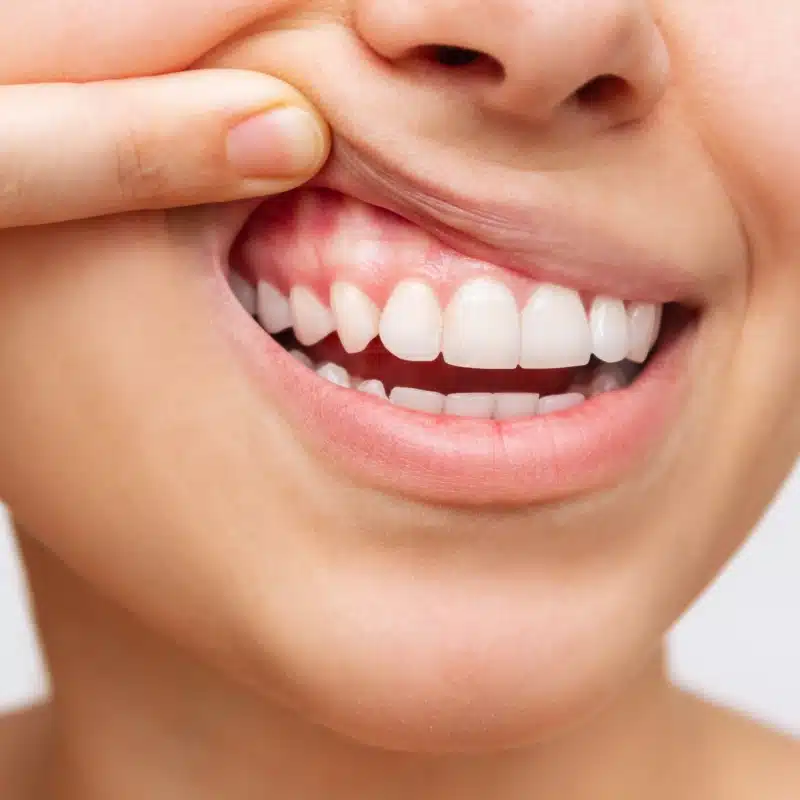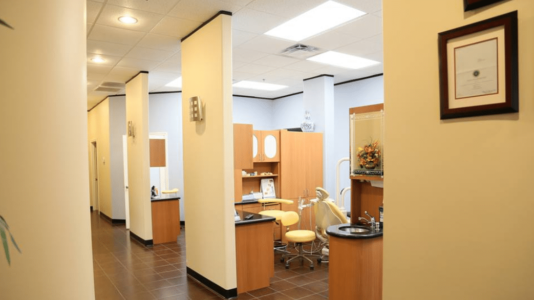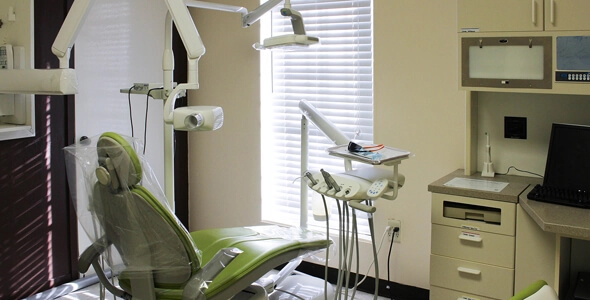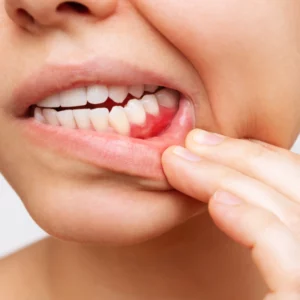The word periodontal means “around the tooth.” Periodontal diseases, also called gum diseases, are serious bacterial infections that attack the gums and the surrounding tissues. If it’s left untreated, the disease will continue and the underlying bone around the teeth will dissolve and will no longer be able to hold the teeth in place. Generally, periodontal disease isn’t painful, so it is possible to have it and not be aware of it.
A dentist specializing in periodontal disease is called a periodontist.
What are the signs and symptoms of periodontal disease?
These are the most common signs and symptoms of gum disease:
- Red, swollen, tender gums
- Bleeding while brushing and/or flossing
- Receding gums (gums that pull away from the teeth)
- Loose or separating teeth
- Persistent bad breath (halitosis)
- Partial dentures that no longer fit
- Pus between the teeth and gums
- A change in bite and jaw alignment
The signs and symptoms of gum disease may look like other conditions or medical problems. See a dentist or other oral health specialist for a diagnosis.
What causes periodontal disease?
As with many other oral health diseases, bacteria and plaque buildup is often the cause. In fact, plaque buildup (which contains many kinds of bacteria) is the leading cause of gum disease. Other factors that contribute to gum disease include:
- Genetics
- Lifestyle choices
- A diet low in nutrients
- Smoking or the use of smokeless tobacco
- Autoimmune or systemic diseases
- Diabetes
- Hormonal changes in the body
- Bruxism (habitual, involuntary clenching or grinding of the teeth)
- Certain medicines
- Excessive alcohol consumption
What are the signs and symptoms of periodontal disease?
1. Gingivitis: The Early Stage
Gingivitis marks the initial stage of gum disease. It is caused by plaque buildup along the gumline due to poor oral hygiene. Symptoms include swollen, red, and bleeding gums. However, gingivitis can be reversed with proper dental care, including regular brushing, flossing, and professional cleanings.
2. Periodontitis: Advancing Disease
If left untreated, gingivitis can progress to periodontitis, a more severe form of gum disease. With periodontitis, the inner layer of the gum and bone pull away from the teeth, forming pockets that collect debris and become infected. This can lead to bone and tooth loss. Symptoms include persistent bad breath, receding gums, and loose teeth. Treatment typically involves deep cleaning procedures such as scaling and root planing, along with antibiotics in more advanced cases.
3. Aggressive Periodontitis: Rapid Progression
Aggressive periodontitis is characterized by rapid progression of gum and bone tissue loss. It often occurs in otherwise healthy individuals and can affect young adults. Symptoms include severe gum recession and rapid destruction of bone structure, leading to tooth instability. Treatment may involve aggressive antibiotic therapy, surgical intervention, and ongoing periodontal maintenance.
4. Chronic Periodontitis: Long-Term Damage
Chronic periodontitis is the most common form of periodontal disease and progresses slowly over time. It is typically associated with aging and poor oral hygiene habits. Symptoms include inflamed gums, deep pockets between teeth and gums, and eventual tooth loss. Treatment options vary depending on the severity of the condition but may include scaling and root planing, gum grafts, and bone regeneration procedures.
5. Necrotizing Periodontal Diseases: Tissue Death
Necrotizing periodontal diseases are rare but severe forms of gum disease characterized by tissue necrosis, or cell death. They are often associated with underlying systemic conditions such as HIV/AIDS or immunosuppression. Symptoms include severe pain, bleeding gums, and ulceration. Treatment involves aggressive antibiotic therapy, removal of necrotic tissue, and supportive care to manage underlying health conditions.
How to Prevent Periodontal Diseases?
Maintaining good oral hygiene is essential for preventing gum diseases and periodontal problems. Regular brushing, flossing, and dental check-ups can help detect and treat issues early on, preventing them from progressing to more severe stages.
Get Periodontal Treatment in Houston, TX with A Dental Care!
If you experience any symptoms of gum disease, such as bleeding gums or persistent bad breath, it’s important to consult with a dental professional promptly to prevent further damage to your oral health. Our Expert Dentists at A Dental Care are here to help. Book a Consultation with A Dental Care and get the best treatment for your Periodontal Problems in Houston, TX!












